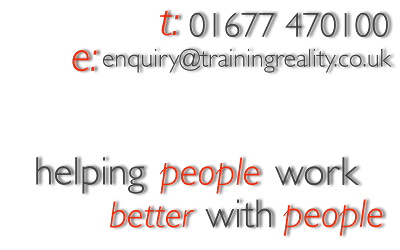Please press (at least!) one of these.
It costs you nothing, and (possibly) helps us spread the word!
Teamwork - part 1
Tuesday, 13 October 2009
A couple of weeks ago, my family and I headed down from Yorkshire to the New Forest for a weekend. We were meeting up with a group of people that I’d been on a training course with, but that none of the rest of my family knew. We’d be staying in a cottage together, cooking and eating together, and meeting each other’s partners/children etc for the first time.
In my personal experience, and, it seems, in the experience of many people I know, getting relatively random groups of people together for a holiday can be a recipe for conflict (possibly not disaster, but you never know...). Different people, different models of the world, different desires, different behaviours, all mixed in with very little emotional credit in the bank, long-term trust and history, or understanding of one another. A bit like teams in many businesses, really.
The fantastic news for me, my family, and the rest of the group was that we had a wonderful weekend away...with not a single issue, conflict, challenge or anything negative whatsoever. This got me thinking - what was it about this group that helped it to stand apart from other groups - especially work teams, either newly created teams, a team with new team members, or even long-standing teams.
I’m firmly of the belief that the more deeply you know someone, the more that they can “get away with” with you, and vice versa. It is far easier to forgive people (and accept some of their behaviours that might clash with yours or your principles) with whom you have long-standing, trusting, open relationships. Unfortunately, at work, we usually don’t have that benefit, and therefore need to find other ways to get along well enough to deliver the best results we possibly can, as a team. However, there are some things that can be modelled across from when it works well (as in the example of my weekend away) into other contexts. Here is my attempt.
teamwork number 1 - accept what you can control
We had a diverse group coming from all across the country, with different needs, travel arrangements, group sizes, arrival and departure times, and so on. Whilst I was interested in exactly where we were staying and what it would be like (see point 5 later!), I couldn’t control everyone else, so had to just allow them to sort there parts out, and me to focus on mine.
My thoughts on this are that:
(a) Don’t worry about what others do. In teams, I often see people, for varying reasons, taking some sort of responsibility for the success and happiness of others, attempting to make things easier for them. Whilst this sounds lovely, ultimately those things are their responsibility, not yours. Trust them to sort their stuff out themselves.
(b) Don’t worry about what others think. A lot of “second-guessing” goes on at work, trying to imagine what someone else might think if this or if that. This takes a lot of effort, and is, in my experience, often inaccurate. I could only make the weekend trip from 11pm on Friday to mid-afternoon on Sunday, and that was it. Would thins mean other people thought I wasn’t fully committed to a long reunion weekend? Maybe, but their thoughts are not in my control.
teamwork number 2 - understand what is important to you
I’m sure that the various members of the “team” that weekend had different desires and expectations for what it might bring. What was important to me was having a great weekend with my family, meeting up with great people again, and having time to relax, chat, and stroll in the forest. Nothing else really mattered. And I managed to achieve all of those things.
My thoughts on this are that:
(a) Keep your list simple. Being realistic about things, rather than being the spoilt child in the sweetshop accompanied by the over-indulgent parents. It would have been very easy for me to create a list of 101 things I wanted to “get out” of the weekend, but by prioritising, I stood a much better chance of success.
(b) Understand yourself. Food is important to me - I love cooking, eating, planning, preparing...the whole range. But I managed to head down there with no idea what we would be eating, where, how, when, or anything else. It’s one thing to know that food is important, but even more powerful to know that it is relatively less important (to me) than who I eat with.
(c) Be content. Building on the point above, I’d got the “who” bit sorted, so why didn’t I push harder on the “what-when-how” bit of dinner? Simple really - I’d got the most important thing to me already, and I don’t have to have my cake iced everytime. Imposing myself in those areas might have had some benefit to me, but it might have had a greater negative impact on others, so why bother?
teamwork number 3 - respect others
During the weekend, everyone got up at different times, went to bed at different times, and did different things with different and changing groups of people.
My thoughts on this are that:
(a) Let people do their thing. Once you are clear on your simple goals that are inside your control, accept that others’ goals might be different, and that they have as much right to pursue those as you do yours. If they match, great. If not, great as well!
(b) Allow people their privacy. There can be a great temptation to constantly ask people what they want to do, or why they want to do it. That is really their thing though - surely much better to give your honest explanation of what you want to do and why, and simply leave the space for them to do the share the same if they want to.
(c) Enjoy differences. Once in a while, show respect for others by allowing them to take control. From Saturday afternoon to our departure on Sunday, I didn’t make a single decision about what I would do - I simply said yes to the suggestions of others. And, as a change from my normal approach, it was wonderful!
teamwork number 4 - know when to go with the flow
Two specific examples of “going with the flow” leap out from this weekend away. The first was when I got up to walk my dogs early on Sunday morning. I was looking forward to it, but couldn’t, because someone had already taken them. The second was the plan for activities on Saturday - my family and I had a plan, but it was changed by others being somewhere different from where we’d expected them to be.
My thoughts on this are that:
(a) Understand other people’s intentions. The dogs were taken out for a walk by two people who loved them, loved the early mornings, and (looking at the bags under my eyes from the long drive!) probably thought I could do with a lie in. Instead of me heading out on my own, I got to spend quiet time with my wife, the dogs got a great walk, and my friends thoroughly enjoyed themselves. We can always try to control things, but I don’t believe anyone can control everything, so relax, trust people, and go with the flow.
(b) Understand your intentions. Why would I feel the need to walk the dogs myself? I do it pretty much every day anyway, I could do it later that same day (and did), and I had other things I could be doing. What would I have been trying to prove by doing it myself? And, even if I had, would I have proved what I wanted to prove, or something different (and less beneficial)?
(c) Be flexible. I had a plan for somewhere to take my family for lunch on Saturday. We decided not to do it in the end because the rest of the group were too far away for us to make the lunch location and meet them. We could have got frustrated by this, but why? Our plan had changed, but we’d ultimately decided to change it, no-one else, and we can always go back another day.
teamwork number 5 - be OK with change
Change, and particularly unexpected change, can sometimes be tricky to manage. One change on the weekend away was a phone call, whilst we were en route, to say that the place we were staying in had changed, provided the postcode of the new cottage, and suggested that I called just before arrival. This was a fairly significant change, as we had two children with us (as well as three dogs), made worse by the fact that, on getting close, we lost all mobile phone signal. Why was that change OK, and what can teams learn from it to improve teamwork?
My thoughts on this are that:
(a) There was nothing we could do about it, so why worry. See point 1 again for the real, powerful importance of simply not worrying about things outside your control.
(b) We had back-up plans if it was really awful - a tent in the car for example. We all have back-up plans if push comes to shove - if things really are so awful, we can go and work somewhere else. There is always another option.
(c) We trusted the organiser (team leader) to take our real needs into account. We had explained our most important requirements to our “team leader”; checked that she understood them, and trusted her to do the right thing for us and for everyone. If she wasn’t trustworthy in this way, why spend time with/work for her?
(d) You don’t have to rely on mobile phones - there are other sorts of communication. We often rely on mobiles, e-mail, memos and so on at work, but there are many alternative communication techniques and variations. If one doesn’t work, don’t sweat...try the next one and the next one, until you find one that does.
Please press (at least!) one of these.
It costs you nothing, and (possibly) helps us spread the word!





